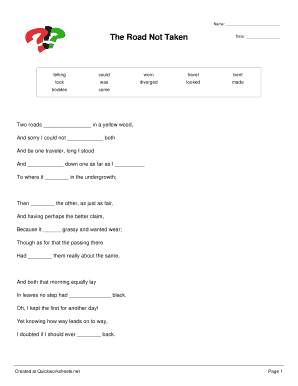
Invite the group to consider the poem's first and last lines as one sentence: Do sometimes people not make a choice? What happens then?.Do you ever have people giving you advice about which road to choose? How does this help you decide?.What about making choices is missing in this poem?.What does this mean to you? Have you ever made any choices that are less traveled?.Two roads diverged in a wood, and I-I took the one less traveled by, and that has made all the difference. What does this line tell us? (It implies that both roads were less traveled.).How does knowing that others have had to make the same choice make a difference to you?Īnd both that morning equally lay in leaves no step had trodden back.What does this line tell us? When do you make big choices, do you do so alone or do you seek advice? Who do you ask?.Though as for that the passing there had worn them really about the same What might this line mean? Do you ever make choices that are different from others but are better for you? How might this apply, if it does, to attending a Unitarian Universalist congregation?.Is it difficult to choose between two unknowns? Is it easier to choose or to be told what to do? Where have you had to do choose?Īnd having perhaps the better claim, because it was grassy and wanted wear.Why did the traveler look down the road to where it bent? Do you ever think about the future? What do see for yourself there?.Why do you think the color yellow (gold) is used? What might Frost be trying to suggest here? Have you ever been in a yellow wood?Īnd looked down one as far as I could to where it bent in the undergrowth.Or, start at the beginning and re-read aloud the first line: If the group has energy around a particular line, begin there.

Getting through all the questions is less important than drawing out children's individual responses to the poem as a whole if you are running out of time for the line-by-line study, skip to the final three questions to give the discussion a meaningful conclusion. Use the discussion questions to explore the poem and children's responses to it.

After they have shared, suggest a method discussion, a line-by-line exploration of the poem, reflecting on what each line means to individuals in the group. What children recall and relay tells you what they found most meaningful or memorable. Invite children to briefly retell the poem in their own words. Ask participants to pay particular attention to the poem and their own reaction to it-not what others say about it. Then, read it aloud or have pre-arranged volunteers read it.Įxplain that now the children will practice listening and discussing skills to understand the poem from the multiple perspectives in the room (or small group). Invite the children to read the poem silently and jot down any thoughts about it. Give each adult facilitator a copy of the poem (Handout 2) and a copy of the prompt questions (below). If the group is large, form small groups.

Articulate this in a one- or two-word sentence you can share with the group during the discussion.

Consider carefully what the poem means to you in relation to the purpose of this session.Copy Handout 2 and the Description of Activity for each adult who may facilitate a group. If the group typically includes more than eight children, consider forming smaller groups of three to five-as many groups as you have adult facilitators.Or ask a participant or adult volunteer in advance if they will read it if possible, give them a copy of the poem in advance. It is more important to use the poem well than to use all the questions. The questions are meant to elicit interpretations of the poem and help children relate it to their lives. Review the questions about the poem and choose those you think will resonate with your group.Activity time: 10 minutes Materials for Activity


 0 kommentar(er)
0 kommentar(er)
